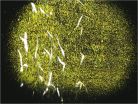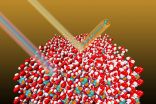(Press-News.org) Montreal, September 30, 2014 — More than 23 per cent of Canadians report being stressed or very stressed on most days. While chronic stress increases the risk of poor mental and physical health, not everyone is affected the same way. Some cope well, but for others — especially those most likely to sweat the small stuff — chronic stress can be harmful.
Thankfully, new research from Concordia University has found a way to identify those most susceptible to stress. That's a huge help for healthcare professionals working to stop stress before it gets out of control.
The proof is in the pulse
In a paper recently published in the journal Stress, Concordia psychology professor Jean-Philippe Gouin followed 76 university students during periods of lower stress at the beginning of term and higher stress during the exam period. He found that, although all students experience similar challenges during finals, only some of them develop significant distress.
With the help of Concordia colleague Sonya Deschênes and Michel Dugas from the Université du Québec en Outaouais, Gouin recorded participants' heart rate variability while they were relaxing and while they were thinking about things they tend to worry about most. They also tracked participants' moods at a time of low stress early in the semester and at a time of high stress right before exams.
They found that those who exhibited a less variable heartbeat when they started worrying were more likely to be highly stressed later on, when faced with finals.
Gouin, who holds a Canada Research Chair in Chronic Stress and Health, explains: "At rest, a more variable heartbeat is a good thing. It shows that your parasympathetic nervous system is hard at work. That's the system that's responsible for the 'rest-and-digest' state of being — the opposite of 'fight-or-flight.' The rest-and-digest phase puts you in a calm state that allows you to conserve and replenish your energy."
Real threat or misplaced worry?
"When you're facing a real threat in your life, a regular heartbeat helps you deal with the situation. If you encounter a lion in the jungle, you want your heartbeat to stay at consistently high levels so that you can run away as fast as you can," says Gouin. "But if your body shows the same reaction when you worry about something that may or may not happen — like failing an exam — then you might be more susceptible to stress.
"By pinpointing those in the general population who are most vulnerable to stress, we can intervene before they hit the breaking point — and hopefully prevent the negative consequences of stress by doing so. That's why it's important to have an objective diagnostic tool like this one."
INFORMATION:
Partners in research: This study was supported by the Canada Research Chairs program and the Fonds de la Recherche en Santé du Québec.
Related links:
Cited study: "Respiratory sinus arrhythmia during worry forecasts stress-related increases in psychological distress" (Stress, September 2014)
Department of Psychology
Jean-Philippe Gouin
Canada Research Chair program
Fonds de la Recherche en Santé du Québec
Media contact:
Cléa Desjardins
Senior advisor, media relations
University Communications Services
Concordia University
Phone: 514-848-2424, ext. 5068
Email: clea.desjardins@concordia.ca
Web: http://www.concordia.ca/now/media-relations
Twitter: @CleaDesjardins
How to predict who will suffer the most from stress
Valuable diagnostic measure pinpointed by new research from Concordia University
2014-09-30
ELSE PRESS RELEASES FROM THIS DATE:
Antioxidant found in grapes uncorks new targets for acne treatment
2014-09-30
Got grapes? UCLA researchers have demonstrated how resveratrol, an antioxidant derived from grapes and found in wine, works to inhibit growth of the bacteria that causes acne.
The team also found that combining resveratrol with a common acne medication, benzoyl peroxide, may enhance the drug's ability to kill the bacteria and could translate into new treatments.
Published in the current online edition of the journal Dermatology and Therapy, the early lab findings demonstrated that resveratrol and benzoyl peroxide attack the acne bacteria, called Propionibacterium acnes, ...
New hypothyroidism treatment guidelines from American Thyroid Association
2014-09-30
New Rochelle, NY, September 30, 2014—Levothyroxine (L-T4), long the standard of care for treating hypothyroidism, is effective in most patients, but some individuals do not regain optimal health on L-T4 monotherapy. New knowledge about thyroid physiology may help to explain these differences. An expert task force of the American Thyroid Association on thyroid hormone replacement reviewed the latest studies on L-T4 therapy and on alternative treatments to determine whether a change to the current standard of care is appropriate, and they present their recommendations in ...
High-speed drug screen
2014-09-30
CAMBRIDGE, MA -- MIT engineers have devised a way to rapidly test hundreds of different drug-delivery vehicles in living animals, making it easier to discover promising new ways to deliver a class of drugs called biologics, which includes antibodies, peptides, RNA, and DNA, to human patients.
In a study appearing in the journal Integrative Biology, the researchers used this technology to identify materials that can efficiently deliver RNA to zebrafish and also to rodents. This type of high-speed screen could help overcome one of the major bottlenecks in developing disease ...
US military making progress reducing stigma tied to seeking help for mental illness
2014-09-30
The U.S. Department of Defense has made progress in reducing the stigma associated with seeking help for mental illnesses such as depression and post-traumatic stress disorder, but more improvement is still needed, according to a new RAND Corporation study.
Despite efforts of both the Defense Department and the Veterans Health Administration to enhance mental health services, many service members still do not seek needed care for mental health problems. Defense officials have made a concerted effort to promote treatment as a way to reduce stigma, according to the study. ...
Laser-guided sea monkeys show how zooplankton migrations may affect global ocean currents
2014-09-30
WASHINGTON, D.C., September 30, 2014--Sea monkeys have captured the popular attention of both children and aquarium hobbyists because of their easily observable life cycle -- sold as dehydrated eggs, these tiny brine shrimp readily hatch, develop and mate given little more than a tank of salt water.
Physicists, though, are interested in a shorter-term pattern: Like other zooplankton, brine shrimp vertically migrate in large groups in response to changing light conditions, coming closer to the surface at night and retreating deeper during the day.
Two researchers at ...
Taking thin films to the extreme
2014-09-30
WASHINGTON D.C., September 30, 2014 – Applying a well-known optical phenomenon called thin-film interference, a group of researchers at Harvard University has demonstrated the ability to "paint" ultra-thin coatings onto a rough surface -- work that holds promise for making future, flexible electronic devices, creating advanced solar cells and detailing the sides of next-gen rocket ships and spacecraft with extremely lightweight decorative logos.
When light passes through oil in water, it becomes iridescent, revealing a myriad of colors that glisten and shift along with ...
Unexpected new mechanism reveals how molecules become trapped in ice
2014-09-30
WASHINGTON D.C., Sept. 30, 2014 – Ice is ubiquitous in nature—found within terrestrial and astrophysical environments alike—and contains many atoms and molecules trapped inside it. For example, ice beneath the world's oceans hosts a vast reservoir of greenhouse gases, which if released would have a profound effect on climate change.
On the earth's surface, seasonal ice and permafrost-covered regions represent a vast reservoir for the collection, concentration and release of environmental and trace gases—encompassing national security concerns about the persistence and ...
Breakthrough study discovers 6 changing faces of 'global killer' bacteria
2014-09-30
Every ten seconds a human being dies from pneumococcus infection making it the leading cause of serious illness across the globe
Research discovers six unique states of pneumococcus
Knowledge of these six characteristics can help in development of tailored vaccines
Every ten seconds a human being dies from Streptococcus pneumoniae infection, also known as pneumococcus, making it a leading global killer.
An interdisciplinary team of researchers from the University of Leicester in collaboration with international experts have unlocked a genetic switch controlling ...
Americans undergo colonoscopies too often, study finds
2014-09-30
Colonoscopies are a very valuable procedure by which to screen for the presence of colorectal cancer. However, it seems that healthy Americans who do undergo this sometimes uncomfortable examination often have repeat screenings long before they actually should. Gina Kruse of Massachusetts General Hospital in the US and colleagues advise that endoscopists stick to the national guidelines more closely. Their findings appear in the Journal of General Internal Medicine, published by Springer.
Current national guidelines strongly recommend that adults aged 50 and older should ...
Longitudinal report shows challenging reality of ageing with an intellectual disability
2014-09-30
Dublin, Ireland, September 30th, 2014 – A new report launched today by the Intellectual Disability Supplement to TILDA (The Irish Longitudinal Study on Ageing) conducted by academics from the School of Nursing and Midwifery, Trinity College Dublin, Ireland, has highlighted the serious, complex and unique health and social challenges facing Ireland's intellectual disability population.
The IDS-TILDA study is the first study of its kind in Europe and the only one in the world with the ability to compare the ageing of people with intellectual disability directly with the ...
LAST 30 PRESS RELEASES:
Study finds more parents saying ‘No’ to vitamin K, putting babies’ brains at risk
Scientists develop new gut health measure that tracks disease
Rice gene discovery could cut fertiliser use while protecting yields
Jumping ‘DNA parasites’ linked to early stages of tumour formation
Ultra-sensitive CAR T cells provide potential strategy to treat solid tumors
Early Neanderthal-Human interbreeding was strongly sex biased
North American bird declines are widespread and accelerating in agricultural hotspots
Researchers recommend strategies for improved genetic privacy legislation
How birds achieve sweet success
More sensitive cell therapy may be a HIT against solid cancers
Scientists map how aging reshapes cells across the entire mammalian body
Hotspots of accelerated bird decline linked to agricultural activity
How ancient attraction shaped the human genome
NJIT faculty named Senior Members of the National Academy of Inventors
App aids substance use recovery in vulnerable populations
College students nationwide received lifesaving education on sudden cardiac death
Oak Ridge National Laboratory launches the Next-Generation Data Centers Institute
Improved short-term sea level change predictions with better AI training
UAlbany researchers develop new laser technique to test mRNA-based therapeutics
New water-treatment system removes nitrogen, phosphorus from farm tile drainage
Major Canadian study finds strong link between cannabis, anxiety and depression
New discovery of younger Ediacaran biota
Lymphovenous bypass: Potential surgical treatment for Alzheimer's disease?
When safety starts with a text message
CSIC develops an antibody that protects immune system cells in vitro from a dangerous hospital-acquired bacterium
New study challenges assumptions behind Africa’s Green Revolution efforts and calls for farmer-centered development models
Immune cells link lactation to long-lasting health
Evolution: Ancient mosquitoes developed a taste for early hominins
Pickleball players’ reported use of protective eyewear
Changes in organ donation after circulatory death in the US
[Press-News.org] How to predict who will suffer the most from stressValuable diagnostic measure pinpointed by new research from Concordia University




